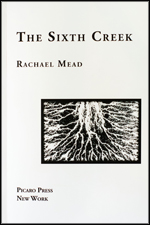
The Sixth Creek by Rachael Mead
Picaro Press, 2013
Rachael Mead is part of a fine group of contemporary Australian poets writing about nature in nuanced and resonant ways. She brings her own slant to the genre with her first collection, The Sixth Creek, while doffing her hat to celebrated writers like Mary Oliver, Thoreau, and Judith Wright. Part I of the collection opens with a quotation from Oliver, and the first poem is a homage to ‘Wild Geese’:
Does it surprise you how it seems good this world, viewed from your knees? Just look. You are not repenting anything …
Mead reiterates Oliver’s stance that even when downtrodden, lonely and forced to your knees, you have the natural world to offer you a shoulder. She also presents the idea that nature is something we can read, or find hard to read; she writes that ‘I’m sure your assumptions are the same as mine;/ our teachers reading from the same books/ on the how, but illiterate/ to the italics of rain …’ Mead boldly asks if we have lost the ability to read the land, a recurring question, for example in the poem ‘Geology’:
Earth drifts beneath our attention/doing the real work ... our surface lives flicker in fast motion not reading in the rip of gorge or cliff what stone, with slow enunciation, suggests.
If we have lost our ability to read nature, have we also lost our awareness of the warning signs? Mead frames these concerns within a deep appreciation for the natural world, and this is apparent in Section II of the collection, which consists mostly of portraits of familiar Australian fauna. In one instance, she becomes the Western Grey kangaroo:
Quiet time is for fast leaping, my shadow paces me like a mate, the mob doubled, fur flying and shadows.
In doing so she invites us to empathise with these animals facing the very real threat of habitat loss and destruction. Her use of repetition and consonance stress the kangaroo’s right to exist, to graze and roam and ‘listen to stories whispered by grass’.
Mead also views nature as ritual. In the poem ‘The anthropologist at the ceremony’ the focus is not on the person who studies humanity, nor on human ritual, but on that which makes humanity possible. She writes of the ‘bridal bouquets’ of eucalypt trees, and of the ‘conversations of bees/that congenial hum, the gossip of grandmothers’, all metaphors that bring to mind the atmosphere of a wedding. Nature is its own party. Mead suggests that we should all attend, or if we seek a deeper connection, enter into a relationship with it. She explores this notion of land as object of longing and desire in ‘Geology’:
Only within the warm pores of caves, or atop metatarsal ranges, do we begin to see this body with desire.
While these poems establish Mead as a nature poet, she also engages with synthetic themes, such as the importance of human connection in a world more reliant on technology than ever. In ‘Power cut’ the problem of the title becomes a solution instead, as two figures are inspired to converse more deeply and appreciate the sunset happening before them. She ends the poem with ‘my wine turns to mead’, wine becoming a metaphor for solitary activity, converted into a drink known for its social connotations. It is also a pun on her name, suggesting that within these conversations she becomes more herself, or who she would like to be.
In the poem ‘The sweetness and the sting’, Mead presents an amusing train of thought, finding parallels within the activity of bees to the desire of a beekeeper for her would be lover, juxtaposing the beekeeper’s actions with her amorous thoughts:
Thought of him rolls in the petals of her mind, then stings. Her longing has the rapid throb of the wasp but the commitment of the bee.
Elsewhere she explores the feelings of a maid at the Adelaide Marble Hill, which was the residence of the Governor of South Australia for seventy years, and is in the area where Mead currently lives. She highlights the aspirations of the servants associated with the heritage residence:
She would rise at dawn the verandah hers for sipping tea watching parrots in pantomime frocks ... feet up, sipping a little sweet sherry ... she would be Lady of this house.
This is the first part in a suite of poems about Marble Hill, which delves into historical moments, such as the bushfires of 1955, and a prosaic account of a tour on Australia Day, 2011, posing the question that all artefacts seem to ask: ‘How do the cabinets manage to support such weight of loss?’
In Part 3 of the collection, Mead openly struggles with her own contradictions; in earlier poems she frowns upon a scientific dissection of nature, but in ‘Perseid Meteor shower’ she admits: ‘I’m a pagan subscribed to NASA’s email list’, going on to abandon the night sky to boot up her computer. In ‘Night walk’ she reveals a fear of nature, and of its inherent darkness. But it is her empathetic understanding of the land that shine strongly within this collection.
It ends on a hopeful note. Mead suggests that despite the poetic rendering of her own feelings for the environment, it is no substitute for the real thing, inviting us to go out and engage with it ourselves.
but while this page is of the earth and trees my words fail, no true reflection, its essence as pervading yet elusive as air.













